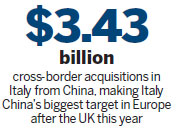
Italy goes on sale for Chinese investors as Li prepares to visit Rome
Comments Print Mail Large Medium SmallClotilde Narzisi and Luca Soliman have run the Caffe Orefici, 200 meters from Milan's iconic Duomo Cathedral, for 10 years. Forced to sell their business because of high taxes, they say their only hope now is to leave it in Chinese hands.
"They are the only ones who are buying," said Narzisi, 43, during a break after the lunch rush of businessmen and shoppers in the heart of Italy's financial capital. "We want to sell, taxes are too high. We work eight hours a day for the state and one hour for us."
Caffe Orefici is among the 18,000 advertisements from businesses and individuals that have been published since February of last year on vendereaicinesi.it - literally, sell to the Chinese - a website that helps Italians attract bids for properties, products and services from Chinese suitors.
While Italian stores turn to the local Chinese community, the country's largest companies are seeking investments directly from the Asian giant. Italy has been China's biggest target in Europe after the UK this year, with cross-border acquisitions of $3.43 billion, according to data available to Bloomberg.
Italian Prime Minister Matteo Renzi, who's struggling to cut Europe's second-biggest debt of more than 2 trillion euros ($2.53 trillion), urged Chinese investors in June, during a Beijing visit, to buy stakes in Italian companies, following his counterparts in Greece and Portugal who tapped Chinese money to raise revenue and exit bailout programs.
And Premier Li Keqiang, who arrives in Rome on Tuesday following his trips to Germany and Russia, will also attend a summit of European and Asian leaders and other business events in Milan before concluding his weeklong European visit.

Link was missing
The Caffe Orefici bar managers turned to vendereaicinesi.it, whose ads are translated into Chinese and can also be published in other Chinese websites for a fee, after striking out with a local agent. Their ad was viewed 400 times in three weeks and they received four expressions of interest, said Narzisi. Ads range from an ice-cream parlor in Tuscany to a historic jeans shop in Cremona to a Ferrari 458 Italia.
"We realized that an online tool to link Italians and Chinese was missing," said Simone Toppino, 35, who with his brother Alberto and Alessandro Zhou co-founded the website, which has a mirror Mandarin site, maimaiouzhou.com. They charge 42 euros to about 90 euros for their services. Most Chinese users of the website live in Italy. Bankruptcies have reached a record high this year, with more than 8,000 companies going bust in the first half in Italy, Cerved Group SpA data show.
Record unemployment
With unemployment near a record at 12.7 percent and a fiscal burden at an all-time high, it is difficult for Italians to get access to credit, so the 321,000 Chinese living in the country are better positioned, as they can count on family networks rather than banks for financing, said Toppino, who is from the northwestern town of Alba.
Prime Minister Renzi flew to China in June with a delegation of dozens of Italian companies to help broker deals. A few weeks later, Italy's state lender announced the sale of a stake in energy grids holding company CDP Reti SpA to State Grid Corp of China for 2.1 billion euros.
People's Bank of China in July disclosed stakes in some of Italy's biggest companies, Fiat SpA, Telecom Italia SpA and Assicurazioni Generali SpA, adding to investments in Eni SpA and Enel SpA in March for a total of 3.04 billion euros.
Growing presence
More than 90 Chinese groups, excluding Hong Kong, had a stake in Italian firms at the end of 2013, up almost 20 percent, according to the Milan-based Italy-China Foundation, which promotes business between the two countries.
Antimo Cappuccio is a Shanghai-based partner of Pirola Pennuto Zei & Associati. The law firm is advising the China Corporate United Pavilion on its mission to bring about 50 companies to the 2015 Milan Expo international fair, which has already sold 1 million tickets in China.
"Confidence has returned and investing in the country is convenient because prices are very low right now and there are jewels being sold for peanuts," Cappuccio said.
Background






